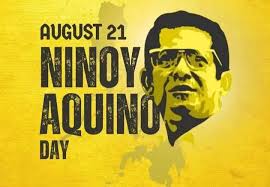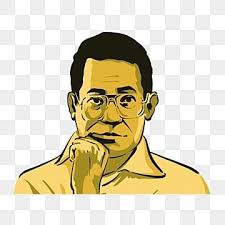Ninoy Aquino Day, observed annually on August 21 in the Philippines, is a national holiday commemorating
the life and legacy of Benigno “Ninoy” Aquino Jr., one of the most influential figures in the country’s history. His assassination in 1983 was a pivotal event that galvanized opposition to the dictatorship of
Ferdinand Marcos and set the stage for the People Power Revolution of 1986. This revolution eventually led to the restoration of democracy in the Philippines.
Table of Contents
Ninoy Aquino Day Background and Early Life

Benigno “Ninoy” Aquino Jr. was born on November 27, 1932, into a prominent political family in Tarlac, Philippines. He was a brilliant and charismatic politician who, at a young age, quickly rose through the political ranks. He became the youngest
mayor in the Philippines at the age of 22, the youngest governor of Tarlac at 27,
and a senator by 34. Known for his eloquence, intelligence, and political acumen, Ninoy was seen as a potential future president of the Philippines.
However, Ninoy Aquino Day career took a sharp turn when Ferdinand Marcos declared martial law in 1972. Ninoy, a leading figure of the opposition, was one of the first to be arrested. He was imprisoned for seven years, much of which he spent in solitary confinement. During his imprisonment, he continued to speak out against the Marcos regime, becoming a symbol of resistance against tyranny.
Exile and Assassination

In 1980, after suffering a heart attack, Ninoy was allowed to leave the Philippines to seek
medical treatment in the United States. He lived in exile in Boston with his family, but even from abroad, he remained an active critic
of the Marcos government. He delivered speeches, wrote articles, and met with Filipino opposition leaders, all while plotting his eventual return to the Philippines.
Ninoy knew that his return would be dangerous. The Marcos regime was still in power, and the country was in a state of political and economic turmoil. Nevertheless, he believed that his presence was
needed to unite the fragmented opposition and inspire the Filipino people to rise against the dictatorship.
On August 21, 1983,Ninoy Aquino Day boarded a flight from Taipei to Manila, fully aware of the risks. As he disembarked from the plane at Manila International Airport, he was assassinated, shot in the head at close range. The assassination shocked the nation and the world. The image of his lifeless body, lying face down on the tarmac,
became an enduring symbol of the fight against tyranny.
Impact of the Assassination
Ninoy Aquino’s assassination marked a turning point in Philippine history. It triggered widespread outrage and protests, both in the Philippines and abroad. His death highlighted the brutality of the Marcos regime and exposed the extent of its corruption and repression. The assassination became the catalyst for a growing
opposition movement that united people from all walks of life, including students, labor unions, religious groups, and business leaders.

In the months following Ninoy’s death,
the “Yellow Revolution” began to take shape, symbolized by the yellow ribbons that adorned trees, lampposts, and buildings across the country. Yellow was the color of Ninoy’s campaign and became the color of the opposition. The phrase “Ninoy, hindi ka nag-iisa” (Ninoy, you are not alone) became a rallying cry for those who opposed the Marcos dictatorship.
The outrage culminated in the snap presidential election of 1986, where Marcos was pitted against Ninoy’s widow, Corazon “Cory” Aquino. Although Marcos was declared the winner amid widespread allegations of electoral fraud.
On February 25, 1986, after four days of massive demonstrations, Marcos fled the country, and Corazon Aquino was installed as the new president of the Philippines. The revolution was a watershed moment, not only in Philippine history but also in the global struggle for democracy.
Ninoy Aquino’s Legacy
Ninoy Aquino is remembered as a martyr for democracy, a man who gave his life for his country’s freedom. His assassination and the subsequent People Power Revolution are seen as the triumph of the Filipino people over dictatorship and oppression.
Ninoy’s famous words, “The Filipino is worth dying for,” have become an enduring testament to his belief in the capacity of the Filipino people to bring about change. These words continue to inspire generations of Filipinos to stand up for their rights and to work towards a just and democratic society.
Ninoy Aquino Day
Ninoy Aquino Day was established by Republic Act No. The holiday is observed as a national non-working holiday, allowing Filipinos to reflect on the sacrifices made by Ninoy Aquino and the importance of democracy and freedom.
In addition to being a day of remembrance, Ninoy Aquino Day serves as a reminder of the ongoing challenges that the Philippines faces in maintaining and strengthening its democratic institutions. It is a day to honor the sacrifices of those who fought for freedom and to renew the commitment to safeguarding the rights and liberties that they fought so hard to achieve.
Global Recognition and Influence
Ninoy Aquino Day Ninoy Aquino’s life and legacy have also had an impact beyond the Philippines. His assassination and the subsequent People Power Revolution are often cited as examples of nonviolent resistance that have inspired similar movements around the world. His story resonates with people in other countries who have struggled against authoritarian regimes and have sought to achieve change through peaceful means.
International leaders have also recognized Ninoy Aquino’s contributions to democracy and human rights. In 1987, the U.S. Congress posthumously awarded him the prestigious Robert F. Kennedy Human Rights Award, in recognition of his tireless advocacy for freedom and justice.
indianfastearning.comBrasil vence Turquia com show de Gabi e conquista bronze no vôlei feminino 2024 Exclusive
Conclusion
Ninoy Aquino Day is not just a day to remember a fallen hero; it is a day to celebrate the enduring spirit of the Filipino people and their unyielding commitment to democracy. The life and death of Ninoy Aquino continue to serve as a powerful reminder of the sacrifices required to protect freedom and the importance of standing up against tyranny.
www.youtube.comhttp://Ninoy Aquino Day







